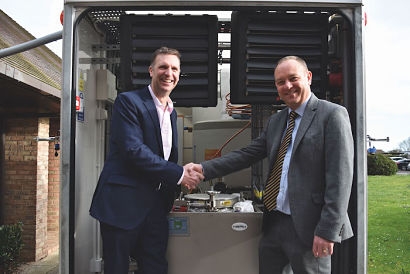
HERU is the world’s first hybrid boiler that takes everyday items, which would have been destined for disposal, such as coffee cups, plastics and nappies, and converts them into energy to heat water for the occupants of homes or commercial buildings.
The process uses controllable and leading-edge heat pipe technology, enabling a highly efficient, low-temperature pyrolysis process to take place, creating outputs that are used to fuel the home. The small amounts of emissions are cleaned before being released to air and sewer without posing risk of harm to human health or the environment.
The HERU process can generate up to 2.5 more energy than is required to operate it. It has been operating 5 days per week, every week to date, since it was first installed at Wychavon District Council in Worcestershire, six months ago. Thus far, the HERU has processed 3-4 kilograms of resource per day, resulting in a total of 420 kilograms of diverted resource from entering the UK ‘waste’ system.
The trials of the system showed that the energy produced during the six-month period was 1.050 kWh for one unit. This means that if taken to each home in the UK, material that was once thrown away could produce 28.3 billion kWh of energy directly to the home.
“I am incredibly pleased with the reliability of the trial unit, the effort that went into the testing before we delivered the HERU into the field has paid dividends” said Founder and CEO of HERU, Nik Spencer. “Having engineers from F1 and aerospace on our team helped us deliver the highest of quality and detail. And naturally, with any trial we have learnt things, so, for example, we changed the valve design to further improve reliability.”
The power and impact of the trials, coupled with 8,640 hours of testing, and the independent analysis has, Nik Spencer believes, the potential to create change on a national basis.
“We hope these trials will drive policy change, so when new homes are built, they don’t have to contribute to the ever-growing problems” Nik added. “We are very much looking to our political figures to be part of this change and help Britain cement itself as pioneers in green technologies on a global basis. From difficult plastics, like coffee cups, yoghurt pots, food-stained black plastics, nappies – all things that are really difficult to recycle – what we are doing is taking that right back to its basic form and converting this as a fuel source for the conventional boiler. How exciting would it be if people actively took home their packaging as they know it could save them money and help the environment.”
Through policy change to behavioural change, the HERU has the potential to change our relationship with what we currently discard, misbelieving it to be rubbish.
Following independent examination of the HERU, consultants from Ricardo Energy & Environment found that, compared to traditional waste collections, the HERU had 300 percent less global warming than co-mingled collections and 280 percent less than kerbside collections.
The ongoing evaluations of the domestic 19 litre HERU are also driving the design of the 240-litre unit, which will be approximately 12 times bigger in capacity, utilising 12 times more resource and expected to produce 12 times more energy for commercial buildings.
For additional information:

